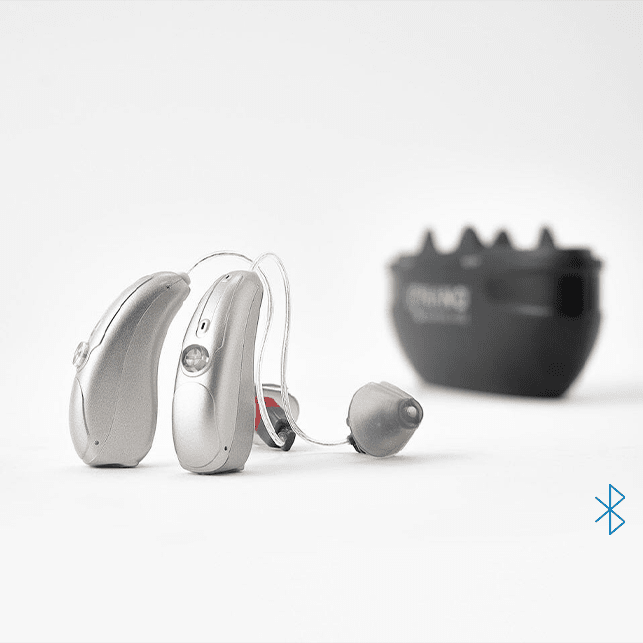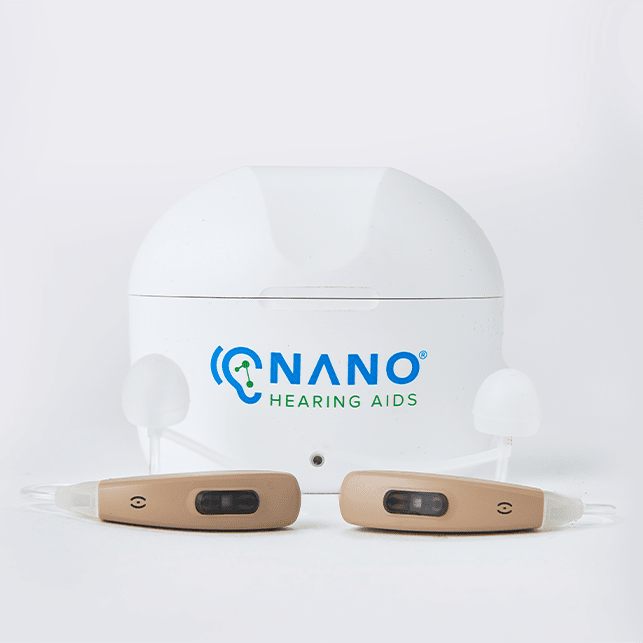Key Takeaways
Living with tinnitus can cause many challenges in daily life, especially when it seems to intensify in quiet environments. For many individuals, the onset of tinnitus symptoms during moments of silence can be particularly distressing.
In this article, we'll share more information about this condition, explain what causes tinnitus to worsen in quiet environments, and offer some tips on how you can better manage it.
What is Tinnitus?
Tinnitus is a condition that causes buzzing or ringing in either both ears or just one ear. The intensity can vary - with some people experiencing a faint background hum and others hearing a persistent, intrusive ringing. It’s a pretty challenging condition to manage.
Unlike physical discomfort such as knee pain - which can often be pinpointed and treated directly - tinnitus is a complex auditory issue that can worsen in quiet environments, making it difficult to relax or sleep.
Potential Causes of Tinnitus
To qualify for NHS hearing aids, you must first meet specific eligibility criteria that focus on the severity of hearing loss and its impact on daily life.

There are two types of tinnitus: subjective and objective. Subjective tinnitus is when only you can hear the noise. It’s usually linked to loud noise exposure, aging, ear infections, or even certain medications. On the other hand, objective tinnitus is rarer and can actually be heard by a doctor during an exam. It’s often tied to issues like high blood pressure, vascular growths, or muscle spasms, with the sounds typically matching up to your heartbeat or muscle movements (image courtesy of Verywell Health).
Why Does Tinnitus Become Worse in a Quiet Environment?
One of the main symptoms of tinnitus is that the ringing or buzzing sound can be exacerbated in quiet environments. This can be attributed to several reasons:
Silence tends to amplify internal bodily sounds, making the ringing or buzzing much more noticeable.
In the absence of external or background noise, the brain might hyperfocus on the internal noise generated by tinnitus, amplifying its perceived intensity.
Quiet environments lack the masking effect of ambient noise, which typically helps to camouflage tinnitus and provide relief for people suffering from the condition.
Environmental Noise and Tinnitus
Environmental noise and outdoor noise - including traffic noise and air traffic - can potentially exacerbate tinnitus symptoms too. Sometimes high levels of noise pollution can increase the risk of developing tinnitus.
Additional Symptoms of Tinnitus
Besides the ringing or buzzing sound, tinnitus can also create many other uncomfortable symptoms which can be continuous or intermittent, including:

Prolonged exposure to loud noise can also damage the delicate hair cells in the inner ear, leading to hearing loss and the onset of tinnitus (image courtesy of Hear4U).
Nano Hearing Aids are FDA-registered, Class I devices. These OTC hearing aids are designed for individuals over 18 years of age with perceived mild to moderate hearing impairment. Nano won the Top ENT Solution Provider 2023, has 24/7 customer care, and has an affordable price compared to others.
Fulfill the Criteria of NHS Hearing Aids
Talking to the GP
The most common way of getting NHS Hearing Aids is by making an appointment with your doctor or GP. The audiologist will make you go through a screening process to understand if you are facing any hearing concerns or not. Some doctors might offer you diagnostic hearing evaluations within their practice. You can also take an online hearing test to determine your level of hearing before visiting your GP. You can show the audiogram results to the doctor.
Referral
After you visit your doctor, they will determine if your hearing loss problem is solvable or not. For example, if you are not suffering from a permanent or sensorineural hearing loss, they can help you recover. Also, if your problem has been caused temporarily by earwax blockage in the ears, they will help you recover from that.
On the other hand, if you need hearing aids to deal with your hearing loss problems, they might not offer a diagnostic service. In that case, they will refer you to the audiology department of a local hospital for going through a diagnostic hearing evaluation.
Appointments
The entire process of making appointments falls under the governmental targets and almost all NHS-associated hospitals should meet these targets. In England, the maximum waiting time between referral by your doctor and receiving your hearing aids is 18 weeks - patients used to wait for two years to get an appointment!
Hearing Aid Fitting
In this fitting appointment, the hearing aids are fitted from an audiological and physical perspective. The hearing aid dispenser or the audiologist will program your hearing aid to your hearing test results. They'll show you how you'll need to put, remove, and maintain your hearing aids. They will also take you through the different features of hearing aids.
The NHS will only loan you the hearing aids - they won't become your property. The hearing aids will remain the property of the trust or the hospital that issues them to you. So, while you can use them for free, you must return them when no longer needed or when you switch to another service provider.
After getting your NHS hearing aids, you need to make a follow-up appointment to regulate how you're getting on with the hearing aids. Also, if you need any adjustments or not, it will be after two weeks or so.
Final Appointment
The audiologist will make adjustments for you during the follow-up appointment if you need any. You can also make any inquiries you have about using your hearing aids. The process officially ends at the end of this final appointment. If you need any ensuing appointments or other help, they will fall outside the governmental targets that were mentioned earlier.
So, it can be a bit difficult to get instant help for any further problems that you might have. This is primarily because of timing and funding issues.
Are NHS Hearing Aids Up to the Mark?
As stated earlier, the NHS primarily provides BTE hearing aids due to their reliability and ease of adjustment. If the hearing problem of a person requires a different solution, in-the-ear (ITE) and invisible hearing aids might be provided - but this only on rare occasions.
The quality of NHS hearing aids and the service level have improved a lot throughout the last few years. You can go for NHS Hearing Aids with zero doubt in mind. They will be able to provide good-quality hearing aids without any cost.
Advantages of NHS Hearing Aids
Disadvantages of NHS Hearing Aids
Final Words
Good-quality hearing aids can be costly if you get them privately. So many people are in dire need of hearing aids but aren't able to use them because of the high cost.
Consequently, their usual life keeps getting hampered, and they find it challenging to communicate with other people and get on with their lives. NHS Hearing Aids can empower them to use hearing aids and start living their lives conveniently - that too without any cost.
Nano OTC hearing aids offer a similar range of options. Our devices are FDA-registered and can be purchased from our online store quickly, without the need for a hearing test or audiologist’s consultation, all at affordable prices.
While currently only available for purchase within the US, we’re committed to supporting international customers in making the best decisions about their hearing aids.

For example, our entry-level model - the First Ear Plus CIC (pictured above) and the First Ear Plus BTE only starts at $297 per pair. All our devices are chargeable which will be more cost-effective in the long run.
Frequently Asked Questions (FAQ)
How do you qualify for a free NHS hearing aid?
You'll need a GP recommendation to have a hearing test through the NHS. If your hearing test indicates that you would benefit from a hearing aid, you are eligible for a free hearing aid.
What type of hearing aids do the NHS give out?
The NHS usually gives out BTE hearing aids.
Will the NHS replace lost hearing aid?
The NHS hearing aid service that fitted your hearing aids can provide you with free batteries and repairs. Hearing aids that have been damaged or lost can be replaced by your local hearing aid service.
What is Nano Hearing Aid?
Nano Hearing Aids manufactures and sells FDA-registered Class 1 OTC hearing aids for adults with perceived mild to moderate hearing loss. Unlike the NHS, Nano devices come in various types like RIC, ITE, BTE, and CIC.




